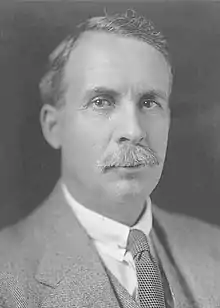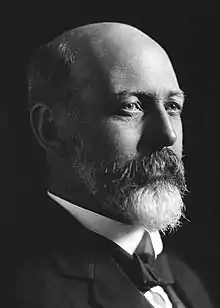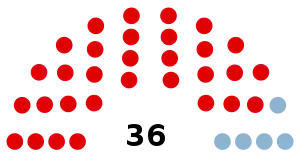| |||||||||||||||||||||||||||||||
All 36 seats in the Senate 18 seats needed for a majority | |||||||||||||||||||||||||||||||
|---|---|---|---|---|---|---|---|---|---|---|---|---|---|---|---|---|---|---|---|---|---|---|---|---|---|---|---|---|---|---|---|
| |||||||||||||||||||||||||||||||
The 5 September 1914 election was a double dissolution election which meant all 36 seats in the Senate were up for election, with each Australian states electing six members, with half to serve a six-year term and the rest to serve a three year term. Terms were taken to have commenced on 1 July 1914. The Senate resolved that in each State the three senators who received the most votes would sit for a six-year term, finishing on 30 June 1920 while the other half would sit for a three-year term, finishing on 30 June 1917.[1]
It was a landslide victory for the Labor Party, which won 31 seats and was the largest party by first preference votes in every state except South Australia. The opposition party, the Commonwealth Liberal Party, won just one seat, which was in South Australia, despite retaining four seats (two each in New South Wales and Tasmania). The Liberal Party lost three seats, one each in New South Wales, Victoria and Tasmania, while Labor lost one seat in New South Wales. Every state except Western Australia and South Australia swung to Labor.
Australia
| Party | Votes | % | Swing | Seats | Change | |||
|---|---|---|---|---|---|---|---|---|
| 6 year term | 3 year term | Total | ||||||
| Labor | 6,119,018 | 52.15 | +3.43 | 17 | 14 | 31 | ||
| Liberal | 5,605,305 | 47.77 | −1.61 | 1 | 4 | 4 | ||
| Independents | 9,799 | 0.08 | −0.78 | |||||
| Total | 11,734,122 | 18 | 18 | 36 | ||||
| Invalid/blank votes | 86,649 | 4.24 | −1.42 | |||||
| Turnout | 2,042,336 | 73.63 | −0.99 | |||||
| Registered voters | 2,811,515 | |||||||
| Source: Psephos: 1914 Senate | ||||||||
New South Wales
Each elector voted for up to six candidates. Percentages refer to the number of voters rather than the number of votes.
| Party | Candidate | Votes | % | ±% | |
|---|---|---|---|---|---|
| Labor | Albert Gardiner (elected 1) | 344,151 | 51.6 | +1.0 [lower-alpha 1] | |
| Labor | Allan McDougall (elected 2) | 342,482 | 51.3 | +0.3 [lower-alpha 1] | |
| Labor | John Grant (elected 3) | 341,934 | 51.2 | +6.0 [lower-alpha 2] | |
| Liberal | Sir Albert Gould (re-elected 4) | 341,569 | 51.1 | −2.5 [lower-alpha 2] | |
| Liberal | Edward Millen (re-elected 5) | 339,476 | 50.9 | −1.6 [lower-alpha 2] | |
| Labor | David Watson (elected 6) | 338,280 | 50.7 | +5.7 [lower-alpha 2] | |
| Liberal | Charles Oakes (defeated) | 333,763 | 50.0 | −2.3 [lower-alpha 2] | |
| Labor | Arthur Rae (defeated) | 333,243 | 49.9 | +0.9 | |
| Labor | Ike Smith | 324,630 | 48.6 | +6.1 [lower-alpha 2] | |
| Liberal | Frank Coen | 324,152 | 48.6 | ||
| Liberal | Herbert Pratten | 322,076 | 48.3 | ||
| Liberal | Arthur Trethowan | 318,788 | 47.8 | ||
| Total formal votes | 4,004,514 667,419 voters |
95.02 | +1.74 | ||
| Informal votes | 34,948 | 4.98 | −1.74 | ||
| Turnout | 702,403 | 64.85 | −4.34 | ||
| Party total votes | |||||
| Labor | 2,024,690 | 50.56 | +6.34 | ||
| Liberal | 1,979,824 | 49.44 | −3.32 | ||
Queensland
Each elector voted for up to six candidates. Percentages refer to the number of voters rather than the number of votes.
| Party | Candidate | Votes | % | ±% | |
|---|---|---|---|---|---|
| Labor | Thomas Givens (re-elected 1) | 152,990 | 57.8 | +7.0 [lower-alpha 1] | |
| Labor | Myles Ferricks (re-elected 2) | 152,469 | 57.6 | +2.8 [lower-alpha 2] | |
| Labor | William Maughan (re-elected 3) | 152,321 | 57.5 | +2.8 [lower-alpha 2] | |
| Labor | James Stewart (re-elected 4) | 151,553 | 57.3 | +7.6 [lower-alpha 1] | |
| Labor | John Mullan (re-elected 5) | 150,703 | 56.9 | +6.4 [lower-alpha 2] | |
| Labor | Harry Turley (re-elected 6) | 150,703 | 56.9 | +6.4 [lower-alpha 1] | |
| Liberal | Thomas Crawford | 114,652 | 43.3 | ||
| Liberal | William Aitchison | 113,317 | 42.8 | ||
| Liberal | Frederick Johnson | 113,230 | 42.8 | ||
| Liberal | Adolphus Jones | 112,640 | 42.6 | ||
| Liberal | Edward Smith | 111,766 | 42.2 | ||
| Liberal | Michael O'Donnell | 111,396 | 42.1 | ||
| Total formal votes | 1,588,266 264,711 voters |
95.77 | +0.90 | ||
| Informal votes | 11,693 | 4.23 | −0.90 | ||
| Turnout | 276,404 | 75.07 | +1.77 | ||
| Party total votes | |||||
| Labor | 911,265 | 57.37 | +3.19 | ||
| Liberal | 677,001 | 42.63 | −3.19 | ||
South Australia
Each elector voted for up to six candidates. Percentages refer to the number of voters rather than the number of votes.
| Party | Candidate | Votes | % | ±% | |
|---|---|---|---|---|---|
| Liberal | John Shannon (elected 1) | 190,590 | 96.1 [lower-alpha 3] | ||
| Labor | John Newlands (re-elected 2) | 112,569 | 56.8 | +4.6 [lower-alpha 2] | |
| Labor | James O'Loghlin (re-elected 3) | 112,283 | 50.6 | +4.1 [lower-alpha 2] | |
| Labor | Robert Guthrie (re-elected 4) | 111,774 | 56.4 | +2.4 [lower-alpha 1] | |
| Labor | William Senior (re-elected 5) | 109,975 | 55.5 | +4.4 [lower-alpha 2] | |
| Labor | William Story (re-elected 6) | 108,263 | 54.6 | +8.1 [lower-alpha 1] | |
| Liberal | Edward Vardon | 90,364 | 45.6 | ||
| Liberal | Benjamin Benny | 89,568 | 45.2 | ||
| Liberal | George Jenkins | 89,194 | 45.0 | ||
| Liberal | George Stewart | 88,042 | 44.4 | ||
| Liberal | Patrick Daley | 87,365 | 44.1 | ||
| Total formal votes | 1,189,987 198,331 voters |
96.16 | +1.90 | ||
| Informal votes | 7,913 | 3.84 | −1.90 | ||
| Turnout | 206,244 | 80.14 | +0.04 | ||
| Party total votes | |||||
| Liberal | 635,123 | 53.37 | +6.97 | ||
| Labor | 554,864 | 46.63 | −6.97 | ||
Sitting senator Gregor McGregor (Labor) had re-nominated but died after the close of nominations, leaving Labor with only 5 candidates. Electors were required to vote for 6 candidates or their vote would be invalid. If there was a large informal vote or if the surplus votes were equally distributed there was a risk of Labor losing more than one seat. Labor therefore asked its supporters to vote for John Shannon (Liberal).[5]
Tasmania
Each elector voted for up to six candidates. Percentages refer to the number of voters rather than the number of votes.
| Party | Candidate | Votes | % | ±% | |
|---|---|---|---|---|---|
| Labor | David O'Keefe (re-elected 1) | 38,879 | 50.9 | −5.3 [lower-alpha 1] | |
| Labor | James Long (re-elected 2) | 39853, | 50.8 | −4.8 [lower-alpha 1] | |
| Labor | James Guy (elected 3) | 39,656 | 50.6 | +6.2 [lower-alpha 2] | |
| Liberal | John Keating (re-elected 4) | 39,193 | 50.0 | −2.3 [lower-alpha 2] | |
| Labor | Rudolph Ready (re-elected 5) | 38,779 | 49.5 | −3.9 [lower-alpha 1] | |
| Liberal | Thomas Bakhap (re-elected 6) | 38,779 | 49.5 | −3.3 [lower-alpha 2] | |
| Labor | William Shoobridge | 38,096 | 48.6 | ||
| Liberal | Edward Mulcahy | 38,016 | 48.5 | ||
| Liberal | Louis Shoobridge | 38,006 | 48.5 | ||
| Labor | James McDonald | 37,771 | 48.2 | ||
| Liberal | John Clemons (defeated) | 36,577 | 46.7 | −4.0 [lower-alpha 2] | |
| Liberal | Hubert Nichols | 36,325 | 46.3 | ||
| Independent | Cyril Cameron | 6,979 | 8.9 | +2.8 [lower-alpha 2] | |
| Independent | David Blanchard | 2,820 | 3.6 | ||
| Total formal votes | 470,292 78,382 voters |
95.29 | +1.51 | ||
| Informal votes | 3,871 | 4.71 | −1.51 | ||
| Turnout | 82,253 | 77.61 | +2.30 | ||
| Party total votes | |||||
| Labor | 234,034 | 49.76 | +3.52 | ||
| Liberal | 226,459 | 48.15 | −3.57 | ||
| Independent | 9,799 | 2.08 | +0.04 | ||
Victoria
Each elector voted for up to six candidates. Percentages refer to the number of voters rather than the number of votes.
| Party | Candidate | Votes | % | ±% | |
|---|---|---|---|---|---|
| Labor | John Barnes (re-elected 1) | 334,782 | 53.7 | +4.5 [lower-alpha 2] | |
| Labor | Stephen Barker (re-elected 2) | 334,517 | 53.6 | +5.2 [lower-alpha 1] | |
| Labor | Edward Russell (re-elected 3) | 334,238 | 53.6 | +3.5 [lower-alpha 2] | |
| Labor | Andrew McKissock (elected 4) | 333,739 | 53.5 | +4.5 [lower-alpha 2] | |
| Labor | Albert Blakey (re-elected 5) | 331,911 | 53.2 | +5.1 [lower-alpha 1] | |
| Labor | Edward Findley (re-elected 6) | 329,198 | 52.8 | +4.1 [lower-alpha 1] | |
| Liberal | James McColl (defeated) | 294,104 | 47.2 | −2.5 [lower-alpha 2] | |
| Liberal | Samuel Mauger | 293,353 | 47.0 | −1.8 [lower-alpha 2] | |
| Liberal | William Edgar | 289,854 | 46.5 | ||
| Liberal | James Hume Cook | 289,478 | 46.4 | ||
| Liberal | William Trenwith | 289,196 | 46.4 | ||
| Liberal | William McLean | 287,542 | 46.1 | ||
| Total formal votes | 3,741,912 623,652 voters |
96.71 | +1.6 | ||
| Informal votes | 21,246 | 3.29 | −1.2 | ||
| Turnout | 644,898 | 79.15 | +3.66 | ||
| Party total votes | |||||
| Labor | 1,998,385 | 53.41 | +3.98 | ||
| Liberal | 1,743,527 | 46.59 | −2.56 | ||
Western Australia
Each elector voted for up to six candidates. Percentages refer to the number of voters rather than the number of votes.
| Party | Candidate | Votes | % | ±% | |
|---|---|---|---|---|---|
| Labor | George Pearce (re-elected 1) | 68,245 | 55.4 | −0.2 [lower-alpha 2] | |
| Labor | Patrick Lynch (re-elected 2) | 66,189 | 53.7 | −0.4 [lower-alpha 2] | |
| Labor | Ted Needham (re-elected 3) | 65,960 | 53.5 | −0.5 [lower-alpha 2] | |
| Labor | George Henderson (re-elected 4) | 65,632 | 53.3 | −2.4 [lower-alpha 1] | |
| Labor | Richard Buzacott (re-elected 5) | 65,303 | 53.0 | −1.2 [lower-alpha 2] | |
| Labor | Hugh de Largie (re-elected 6) | 64,452 | 52.3 | +0.4 [lower-alpha 1] | |
| Liberal | William Butcher | 61,288 | 49.7 | +3.9 [lower-alpha 2] | |
| Liberal | William Dempster | 58,208 | 47.2 | ||
| Liberal | George Throssell | 56,973 | 46.2 | ||
| Liberal | John Thomson | 56,290 | 45.7 | ||
| Liberal | Victor Spencer | 55,448 | 45.0 | ||
| Liberal | Charles North | 55,164 | 44.8 | ||
| Total formal votes | 739,152 123,192 voters |
94.67 | +1.3 | ||
| Informal votes | 6,942 | 5.33 | −0.91 | ||
| Turnout | 130,134 | 71.46 | −2.04 | ||
| Party total votes | |||||
| Labor | 395,781 | 53.55 | −1.03 | ||
| Liberal | 343,371 | 46.45 | +1.03 | ||
See also
Notes
References
- ↑ "Rotation of Senators" (PDF). Parliamentary Debates (Hansard). Commonwealth of Australia: Senate. 9 October 1914. p. 41.
- ↑ Carr, Adam. "1914 Senate New South Wales". Psephos.
- ↑ Carr, Adam. "1914 Senate Queensland". Psephos.
- ↑ Carr, Adam. "1914 Senate South Australia". Psephos.
- 1 2 "Warning to Labor electors". Daily Herald. 29 August 1914. p. 4. Retrieved 22 July 2022 – via Trove.
- ↑ Carr, Adam. "1914 Senate Tasmania". Psephos.
- ↑ Carr, Adam. "1914 Senate Victoria". Psephos.
- ↑ Carr, Adam. "1914 Senate Western Australia". Psephos.


